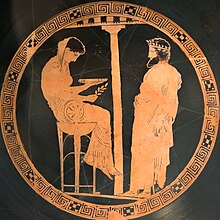– Beliefs and Mythology:
– Polytheistic religion
– Gods and goddesses with human-like characteristics
– Belief in the existence of spirits and monsters
– Myths explaining natural phenomena
– Stories of heroes and epic battles
– Rituals and Ceremonies:
– Offerings and sacrifices to the gods
– Participation in festivals and processions
– Purification rituals before entering sacred spaces
– Divination practices to seek guidance from the gods
– Worship at temples and shrines
– Oracles and Divination:
– Oracle of Delphi as a prominent divination site
– Consulting the Pythia for guidance on important decisions
– Interpretation of omens and signs in nature
– Belief in fate and destiny influenced by divination
– Role of priests and priestesses in facilitating communication with the divine
– Public Religion vs. Cult Practices:
– Public ceremonies honoring major gods like Zeus and Athena
– Cults dedicated to specific deities or heroes
– Mysteries and secret rituals in cults like the Eleusinian Mysteries
– Involvement of different city-states in religious practices
– Varied religious traditions across regions of ancient Greece
– Influence on Culture and Society:
– Integration of religion into daily life and governance
– Artistic expressions of religious themes in sculpture and pottery
– Moral values and ethics derived from religious teachings
– Role of religion in shaping political decisions and conflicts
– Impact of religious beliefs on literature and philosophy
Religious practices in ancient Greece encompassed a collection of beliefs, rituals, and mythology, in the form of both popular public religion and cult practices. The application of the modern concept of "religion" to ancient cultures has been questioned as anachronistic. The ancient Greeks did not have a word for 'religion' in the modern sense. Likewise, no Greek writer known to us classifies either the gods or the cult practices into separate 'religions'. Instead, for example, Herodotus speaks of the Hellenes as having "common shrines of the gods and sacrifices, and the same kinds of customs."

Most ancient Greeks recognized the twelve major Olympian gods and goddesses—Zeus, Hera, Poseidon, Demeter, Athena, Ares, Aphrodite, Apollo, Artemis, Hephaestus, Hermes, and either Hestia or Dionysus—although philosophies such as Stoicism and some forms of Platonism used language that seems to assume a single transcendent deity. The worship of these deities, and several others, was found across the Greek world, though they often have different epithets that distinguished aspects of the deity, and often reflect the absorption of other local deities into the pan-Hellenic scheme.
The religious practices of the Greeks extended beyond mainland Greece, to the islands and coasts of Ionia in Asia Minor, to Magna Graecia (Sicily and southern Italy), and to scattered Greek colonies in the Western Mediterranean, such as Massalia (Marseille). Early Italian religions such as the Etruscan religion were influenced by Greek religion and subsequently influenced much of the ancient Roman religion.
